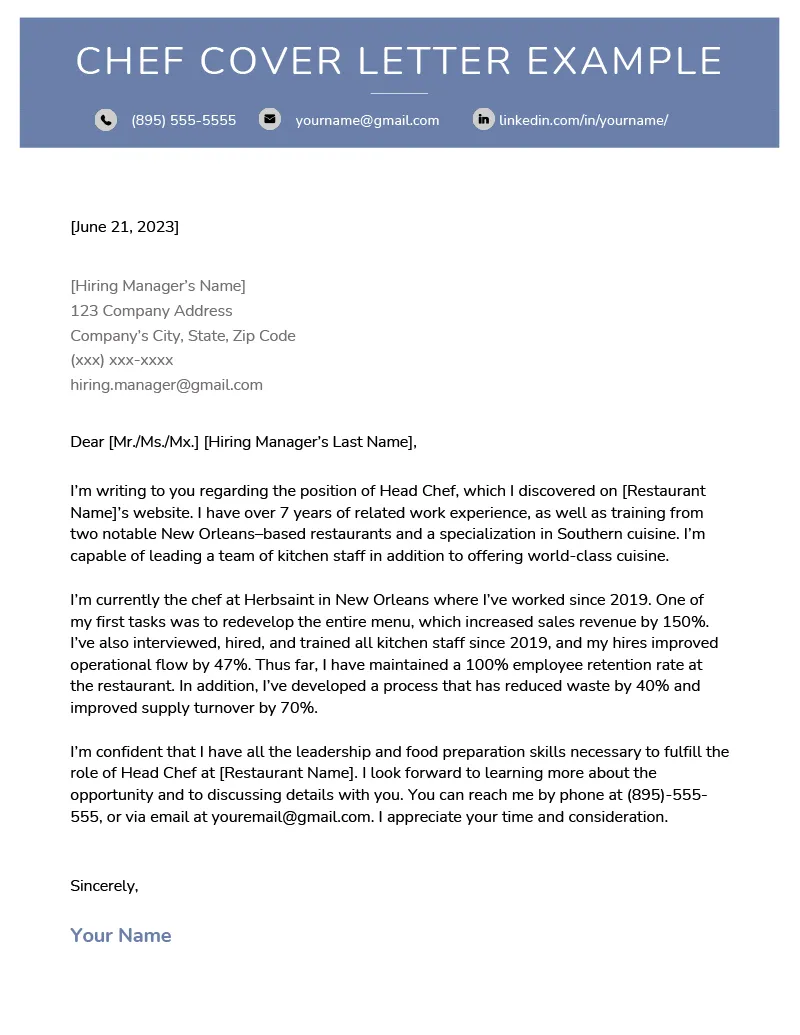What is a Culinary Cover Letter
A culinary cover letter is a crucial document that accompanies your resume when applying for culinary positions. It serves as your introduction to a potential employer, providing a snapshot of your skills, experience, and passion for the culinary arts. Unlike a resume, which is a straightforward list of qualifications, a cover letter allows you to express your personality, elaborate on your experiences, and demonstrate why you are the perfect fit for the role and the establishment. It’s your chance to make a strong first impression and stand out from other applicants. A well-crafted cover letter can significantly increase your chances of landing an interview and ultimately securing your dream job in the competitive world of culinary arts.
Why Do You Need a Culinary Cover Letter
In the culinary industry, where passion, creativity, and attention to detail are paramount, a cover letter is essential. It provides you with the opportunity to go beyond the bullet points of your resume and showcase your unique personality and culinary philosophy. A cover letter allows you to connect with the hiring manager on a personal level, demonstrating your genuine interest in the specific position and the restaurant or establishment. It shows that you’ve taken the time to research the company, understand their values, and tailor your application accordingly. Furthermore, a cover letter allows you to explain any gaps in your employment history, career changes, or other factors that might need clarification. It’s your chance to control the narrative and present yourself in the best possible light.
Key Elements of a Great Culinary Cover Letter
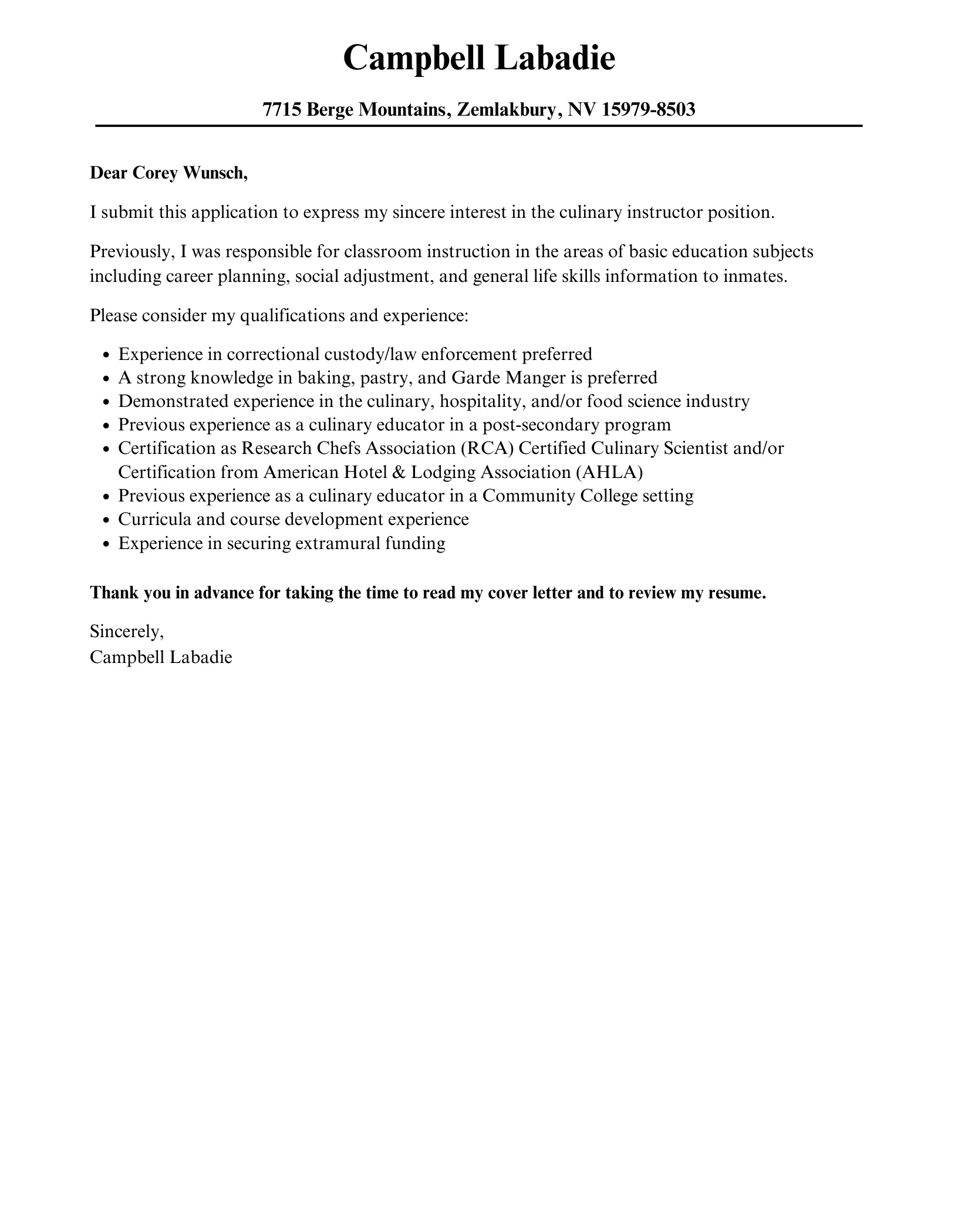
Contact Information & Header
Begin your cover letter with a professional header that includes your name, address, phone number, and email address. Ensure that your contact information is accurate and up-to-date. If you have a culinary portfolio or an online presence, such as a personal website or a LinkedIn profile, consider including a link to it in your header. The header should be visually appealing and easy to read, reflecting the same level of attention to detail that you would apply to your cooking.
Personalized Salutation
Address the hiring manager by name whenever possible. Research the company to find out the name of the person responsible for hiring. A personalized salutation, such as “Dear Mr. Smith,” shows that you’ve taken the time to learn about the company and are genuinely interested in the opportunity. If you are unable to find a specific name, you can use a general salutation, such as “Dear Hiring Manager,” but a personalized approach is always preferred. Avoid generic greetings like “To Whom It May Concern.”
The Opening Paragraph Grab Attention
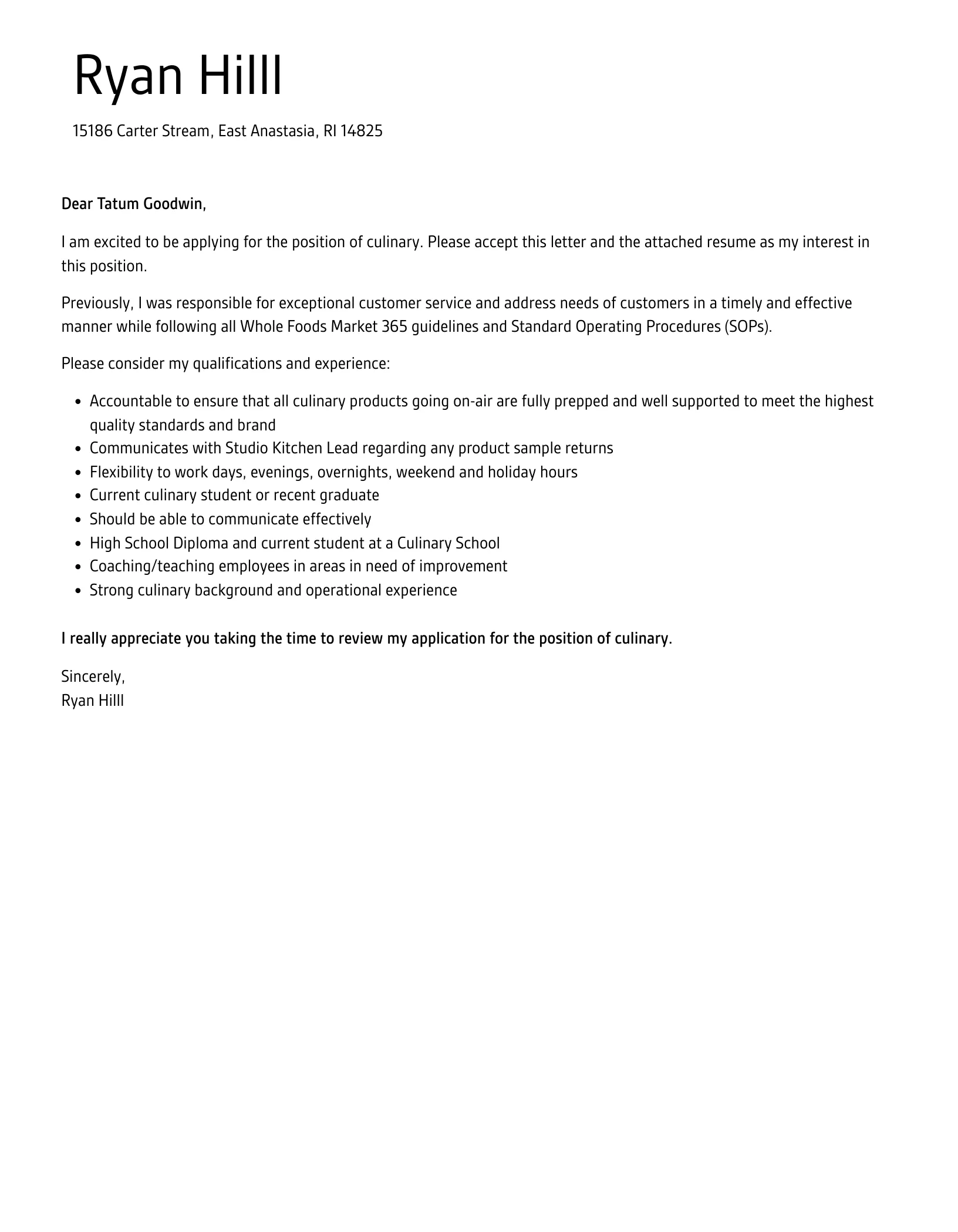
The opening paragraph is your chance to capture the hiring manager’s attention. Start with a strong statement that immediately conveys your enthusiasm for the position and the company. Briefly mention the specific role you are applying for and where you saw the job posting. Consider including a compelling anecdote or a concise statement that highlights your key skill or achievement related to the role. This paragraph sets the tone for the rest of your letter and encourages the reader to continue.
Highlighting Your Culinary Skills & Experience
In the body of your cover letter, elaborate on your culinary skills and experience. Focus on the skills and experiences most relevant to the job you are applying for. Provide specific examples of how you have demonstrated these skills in previous roles. For instance, if the job description emphasizes experience with a particular cuisine, detail your experience with that cuisine. Highlight any specializations, such as pastry, sauces, or butchery. Use strong action verbs to describe your responsibilities and achievements. Quantify your accomplishments whenever possible to demonstrate the impact you’ve made in previous positions. The key is to show, not just tell, what you can do. (See image: culinary-cover-letter-skills.webp)
Showcasing Your Passion
The culinary world is fueled by passion. Use your cover letter to convey your enthusiasm for food, cooking, and the culinary arts. Discuss what inspires you to cook and why you are drawn to this particular restaurant or role. Share your culinary philosophy, the types of dishes you enjoy creating, and any special ingredients or techniques that you are passionate about. This is also an excellent opportunity to show how your personal values align with the restaurant’s philosophy. (See image: culinary-cover-letter-passion.webp)
Quantifying Your Achievements
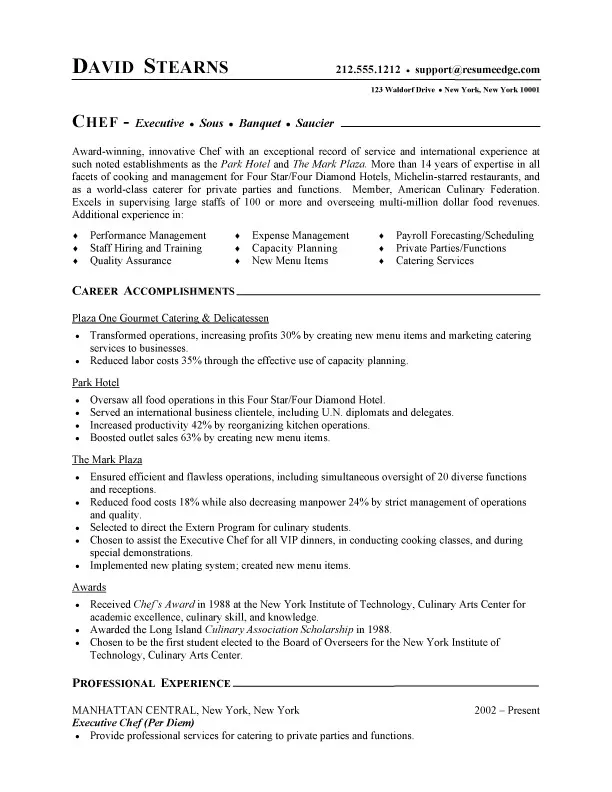
Whenever possible, quantify your achievements to demonstrate the impact you’ve made in previous roles. Use numbers to showcase your success. For example, instead of saying “Managed a busy kitchen,” you could say “Managed a team of 15 cooks in a high-volume kitchen, serving an average of 300 covers per night.” Use percentages, dollar amounts, or other metrics to highlight your contributions to previous employers. This will help your prospective employer to quickly understand the value you bring to the table. (See image: culinary-cover-letter-achievements.webp)
Addressing the Specific Job & Company
Tailor your cover letter to each job application. Research the company and the specific role to understand their needs and expectations. Address the requirements outlined in the job description and explain how your skills and experience align with those needs. Mention specific dishes or culinary styles that are relevant to the restaurant’s menu. Show that you are genuinely interested in the company and have taken the time to learn about their values and goals. Highlighting this will make you stand out from other applicants. (See image: culinary-cover-letter-company.webp)
Call to Action & Closing
In your closing paragraph, reiterate your interest in the position and express your enthusiasm for the opportunity. Include a clear call to action, such as “I am eager to discuss my qualifications further in an interview.” Thank the hiring manager for their time and consideration. End your cover letter with a professional closing, such as “Sincerely” or “Best regards,” followed by your name.
Formatting and Proofreading
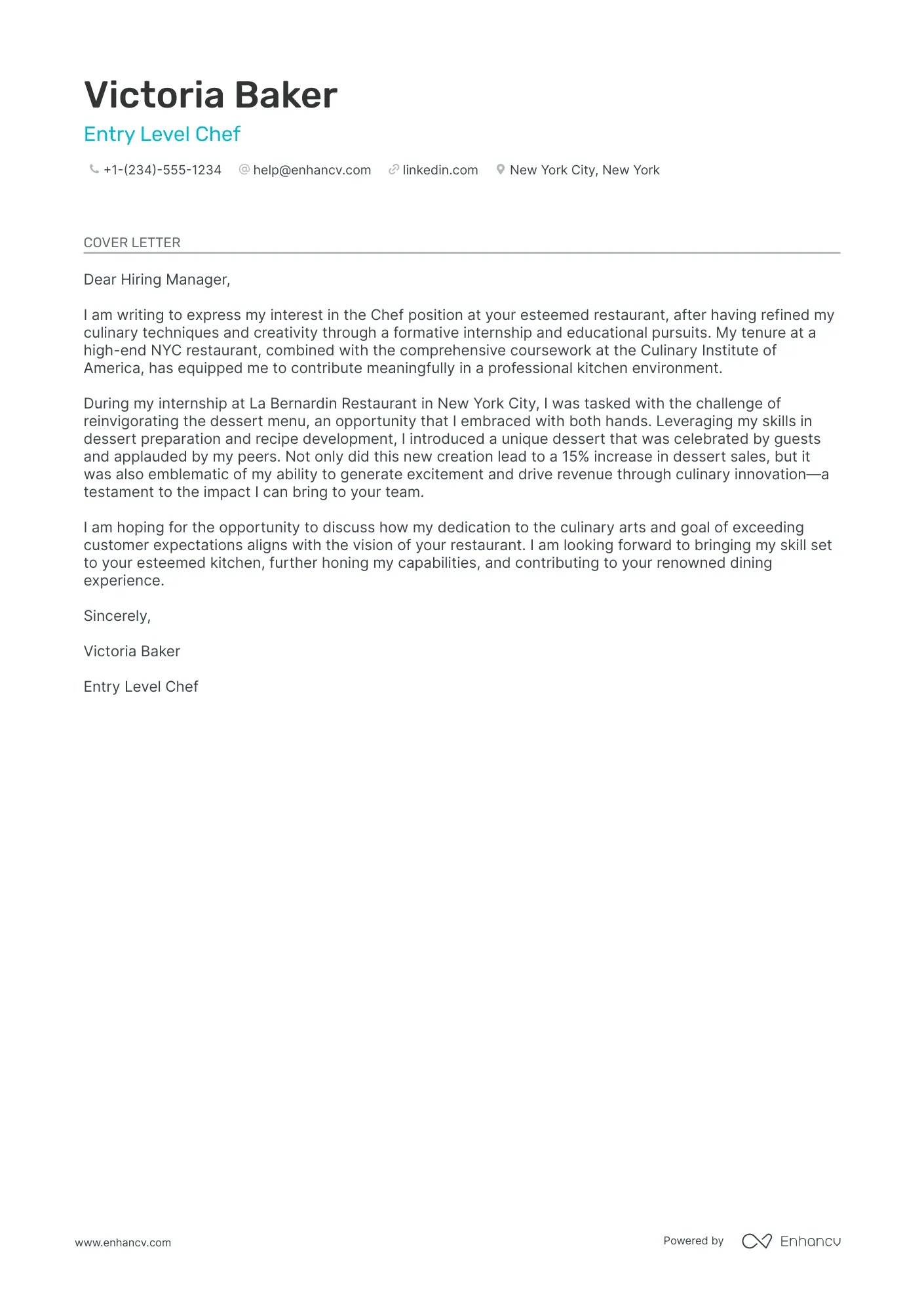
Ensure your cover letter is well-formatted, easy to read, and free of errors. Use a professional font, such as Times New Roman or Arial, and maintain consistent formatting throughout the document. Keep the letter concise, ideally no more than one page in length. Proofread your cover letter carefully for any typos, grammatical errors, or spelling mistakes. Have a friend or family member review it as well. A polished and professional cover letter demonstrates your attention to detail and professionalism. (See image: culinary-cover-letter-formatting.webp)
Culinary Cover Letter Examples
Example 1 Entry-Level Cook
Dear Hiring Manager,
I am writing to express my interest in the Entry-Level Cook position at [Restaurant Name], as advertised on [Platform]. As a recent graduate of [Culinary School] with a passion for creating delicious and visually appealing dishes, I am eager to begin my culinary career. I have experience in various kitchen stations, including [mention specific stations], and am proficient in [mention specific cooking techniques]. I am a quick learner, a team player, and dedicated to upholding the highest standards of food safety and hygiene. I am particularly drawn to [Restaurant Name]’s commitment to [mention a specific value or aspect of the restaurant]. I am available for an interview at your earliest convenience. Thank you for your consideration.
Sincerely, [Your Name]
Example 2 Experienced Chef
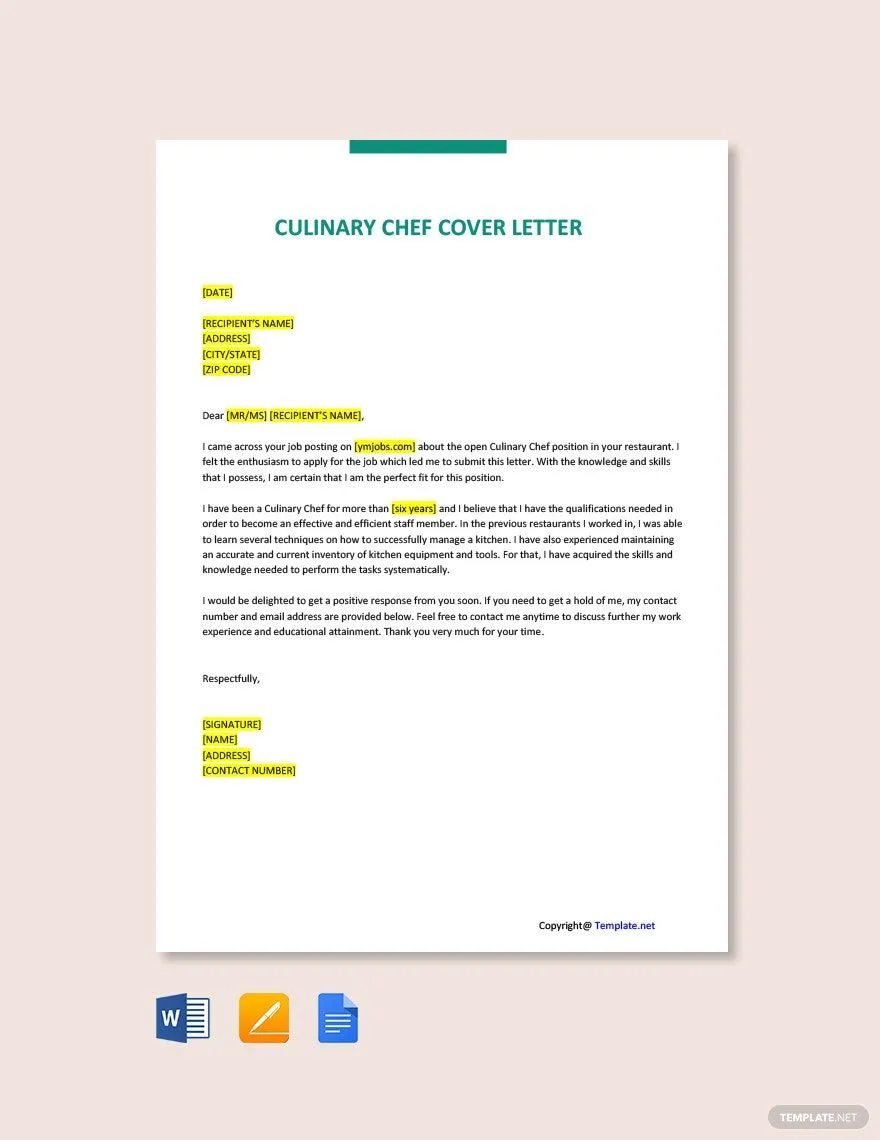
Dear [Hiring Manager Name],
I am writing to express my interest in the Chef position at [Restaurant Name], as advertised on [Platform]. With over [Number] years of experience in the culinary industry, including [mention specific experiences], I am confident in my ability to lead and inspire a kitchen team. In my previous role at [Previous Restaurant], I successfully [mention a key achievement, e.g., developed new menu items, reduced food costs by X%, etc.]. I am proficient in [mention specific cuisines or cooking styles]. I am particularly impressed by [Restaurant Name]’s innovative approach to [mention something specific about the restaurant]. I am excited about the opportunity to contribute to the success of your restaurant. My resume provides further detail on my qualifications. I would welcome the chance to discuss my experience with you in an interview.
Best regards, [Your Name]
Example 3 Restaurant Manager
Dear [Hiring Manager Name],
I am writing to express my interest in the Restaurant Manager position at [Restaurant Name], as advertised on [Platform]. With a proven track record of managing successful restaurants, including [mention specific experiences and achievements], I am confident in my ability to lead your team. In my previous role at [Previous Restaurant], I implemented [mention key strategies, e.g., staff training programs, cost-saving initiatives, etc.] which resulted in [mention positive outcomes]. I have excellent knowledge in restaurant operations, including front-of-house and back-of-house management, staff training, and inventory control. I am drawn to [Restaurant Name]’s commitment to [mention a specific value or aspect of the restaurant]. I am eager to apply my skills and experience to contribute to the success of your restaurant. I am available for an interview at your convenience.
Sincerely, [Your Name]
Tips for Tailoring Your Cover Letter
Research the Company & Job Description
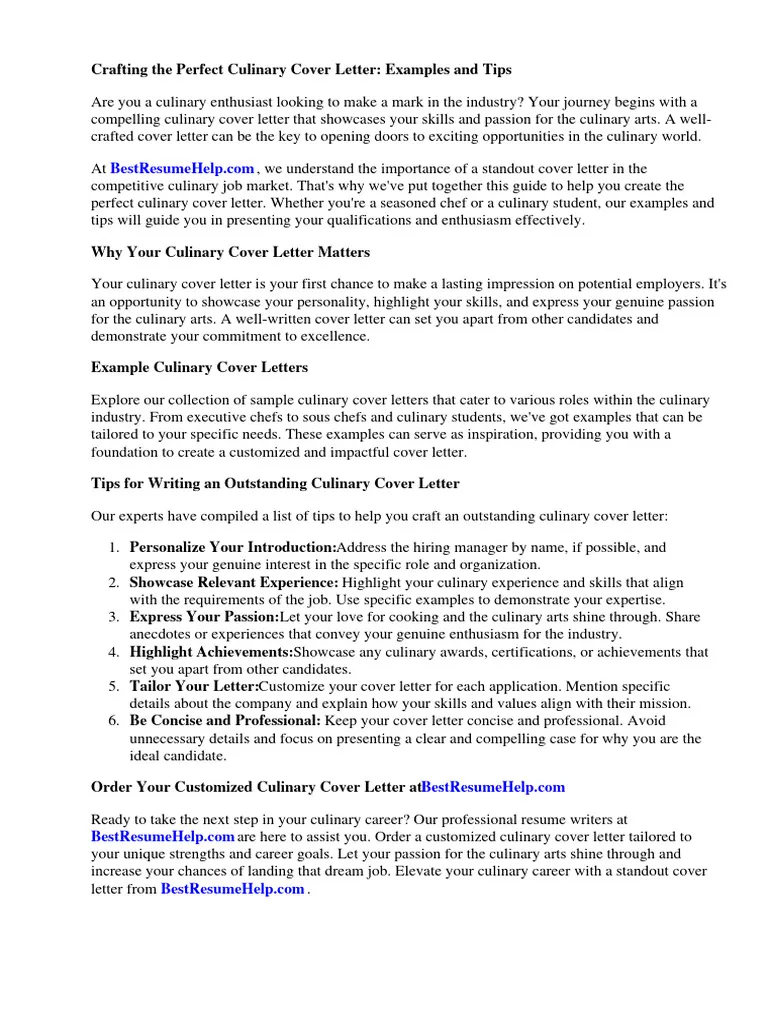
Before you start writing your cover letter, thoroughly research the company and the specific job description. Understand the restaurant’s concept, menu, and values. This will help you tailor your cover letter to the specific needs of the employer. Identify the key skills and qualifications that the employer is looking for and highlight your relevant experience. Look for keywords and phrases used in the job description and incorporate them into your cover letter where appropriate. This will demonstrate that you have read and understood the requirements of the position.
Use Keywords from the Job Posting
Carefully analyze the job posting and identify keywords related to the required skills, experience, and responsibilities. Then, strategically incorporate these keywords into your cover letter. This will help your application pass through applicant tracking systems (ATS) and will also show the hiring manager that you have the necessary qualifications. However, avoid keyword stuffing. Make sure the use of keywords flows naturally within the context of your writing.
Focus on Relevant Experience
Highlight the experience that is most relevant to the specific job you are applying for. Instead of listing every job you’ve ever had, focus on your experience in positions or settings similar to the one you are seeking. If the job requires experience with a specific cuisine or cooking technique, make sure to showcase your expertise in those areas. Quantify your achievements with numbers and data to demonstrate the impact you’ve made in your previous roles. Tailor your cover letter to address how your skills and experiences align with the requirements outlined in the job description.
Proofread Carefully
Before you send your cover letter, proofread it multiple times for any typos, grammatical errors, or spelling mistakes. A cover letter filled with errors can create a negative impression and might lead the hiring manager to believe that you lack attention to detail. Have a friend, family member, or career advisor review your cover letter to catch any errors you might have missed. A polished and error-free cover letter will demonstrate your professionalism and increase your chances of getting an interview. (See image: culinary-cover-letter-mistakes.webp)
Common Mistakes to Avoid
Generic Cover Letters
Avoid sending generic cover letters that can be used for any job application. Tailor each cover letter to the specific job and company. Generic letters lack personalization and demonstrate a lack of genuine interest in the opportunity. They do not show the hiring manager that you have taken the time to learn about the company and understand their needs. Always personalize your cover letter by addressing the hiring manager by name, researching the company, and highlighting your relevant skills and experience.
Typos & Grammatical Errors
Typos and grammatical errors can undermine the professionalism of your cover letter and give the impression that you are careless or inattentive to detail. Carefully proofread your cover letter before submitting it. Double-check your spelling, grammar, and punctuation. Use a grammar checker tool to help you identify and correct errors. If possible, have someone else review your cover letter as a fresh pair of eyes can often spot errors you might miss.
Not Highlighting Achievements
A cover letter is your opportunity to go beyond simply listing your job responsibilities. It’s where you can showcase your achievements and quantify your success. Don’t just say that you managed a kitchen; instead, explain how you increased efficiency or reduced costs. Quantify your accomplishments with numbers, percentages, and data to demonstrate the impact you’ve made in your previous roles. Highlighting your achievements will make you stand out from other applicants and show the hiring manager that you are a results-oriented candidate.
Ignoring the Job Description
Failing to address the requirements outlined in the job description is a significant mistake. The job description is your guide to what the employer is looking for. Tailor your cover letter to meet those requirements by highlighting the skills and experience that match the job’s needs. Incorporate relevant keywords and phrases from the job description. Show the hiring manager that you understand the role and have the qualifications necessary to excel in it.
Conclusion
Crafting a compelling culinary cover letter can significantly boost your chances of landing your dream job in the culinary world. By understanding the key elements, tailoring your letter to each specific job, and avoiding common mistakes, you can create a cover letter that will impress hiring managers and showcase your unique skills and passion. Remember to highlight your achievements, quantify your successes, and convey your enthusiasm for the culinary arts. Good luck with your job search!
